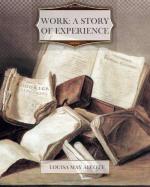“I am better here, thank you; for I have been and mean to be a working-woman all my life.”
“Hear! hear!” cried a stout matron in a gay bonnet, and the rest indorsed the sentiment with a hearty round. Then they were very still, and then in a clear, steady voice, with the sympathetic undertone to it that is so magical in its effect, Christie made her first speech in public since she left the stage.
That early training stood her in good stead now, giving her self-possession, power of voice, and ease of gesture; while the purpose at her heart lent her the sort of simple eloquence that touches, persuades, and convinces better than logic, flattery, or oratory.
What she said she hardly knew: words came faster than she could utter them, thoughts pressed upon her, and all the lessons of her life rose vividly before her to give weight to her arguments, value to her counsel, and the force of truth to every sentence she uttered. She had known so many of the same trials, troubles, and temptations that she could speak understandingly of them; and, better still, she had conquered or outlived so many of them, that she could not only pity but help others to do as she had done. Having found in labor her best teacher, comforter, and friend, she could tell those who listened that, no matter how hard or humble the task at the beginning, if faithfully and bravely performed, it would surely prove a stepping-stone to something better, and with each honest effort they were fitting themselves for the nobler labor, and larger liberty God meant them to enjoy.
The women felt that this speaker was one of them; for the same lines were on her face that they saw on their own, her hands were no fine lady’s hands, her dress plainer than some of theirs, her speech simple enough for all to understand; cheerful, comforting, and full of practical suggestion, illustrations out of their own experience, and a spirit of companionship that uplifted their despondent hearts.
Yet more impressive than any thing she said was the subtle magnetism of character, for that has a universal language which all can understand. They saw and felt that a genuine woman stood down there among them like a sister, ready with head, heart, and hand to help them help themselves; not offering pity as an alms, but justice as a right. Hardship and sorrow, long effort and late-won reward had been hers they knew; wifehood, motherhood, and widowhood brought her very near to them; and behind her was the background of an earnest life, against which this figure with health on the cheeks, hope in the eyes, courage on the lips, and the ardor of a wide benevolence warming the whole countenance stood out full of unconscious dignity and beauty; an example to comfort, touch, and inspire them.
It was not a long speech, and in it there was no learning, no statistics, and no politics; yet it was the speech of the evening, and when it was over no one else seemed to have any thing to say. As the meeting broke up Christie’s hand was shaken by many roughened by the needle, stained with printer’s ink, or hard with humbler toil; many faces smiled gratefully at her, and many voices thanked her heartily. But sweeter than any applause were the words of one woman who grasped her hand, and whispered with wet eyes:




